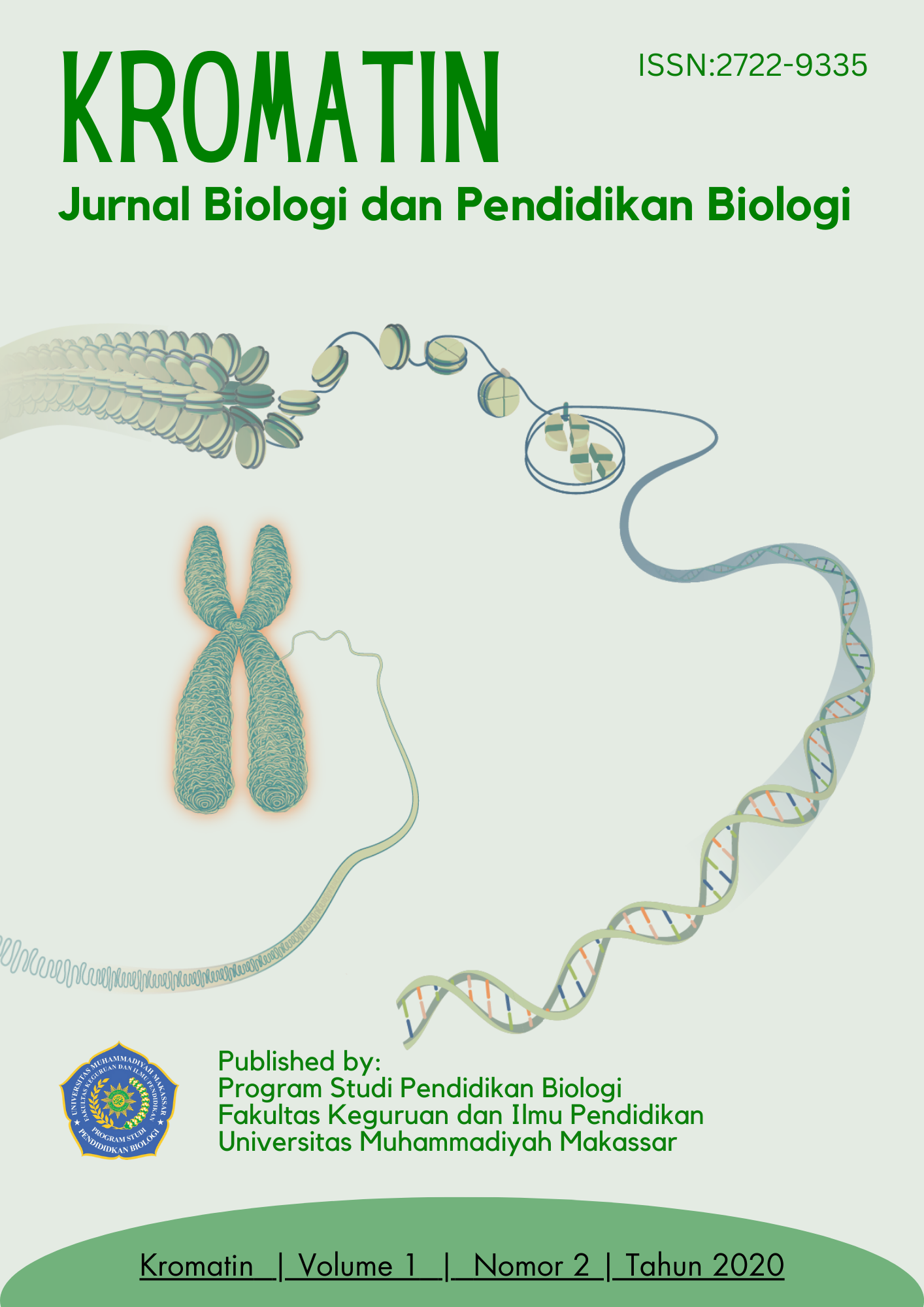Pengaruh Model Pembelajaran Inkuiri Terbimbing dengan Menggunakan LKS Berbasis Think-Talk-Write Pada Materi Sistem Peredaran Darah Terhadap Hasil Belajar Siswa Kelas Xi SMA Datuk Ribandang Makassar
الملخص
This type of research is Quasi Experiment. The problem formulation of this research is whether there is an effect of the Guided Inquiry learning model using Think-Talk-Write Based Worksheet on the Circulatory System Material on the learning outcomes of students in class XI IPA SMA Datuk Ribandang Makassar. The purpose of this study was to determine the effect of the Guided Inquiry learning model using Think-Talk-Write-based LKS on the learning outcomes of class XI students at SMA Datuk Ribandang Makassar. The research design used was Post-test Only Control. The results showed that the average student learning outcomes in the experimental class who were taught using the Guided Inquiry learning model using Think-Talk-Write-based LKS was 82.87, so it could be concluded that there was an influence of the Guided Inquiry learning model using Think-Talk-based LKS. Talk-Write on students' cognitive learning outcomes regarding the circulatory system class XI IPA 1 SMA Datuk Ribandang Makassar. Keywords: Cooperative, Jigsaw, learning outcomes, student activitiesالمراجع
Al-Tabany,T.I.B. 2014. Mendesain Model Pembelajaran Inovatif, Progresif Dan Kontekstual. Jakarta : Kencana.
Agung, Dzikie.P & Dwi Widjanarko. 2015. Penerapan Model Pembelajaran Inkuiri Untuk Meningkatakan Hasil Belajar Siswa Pada Kompetensi Memelihara Komponen Sistem Bahan Bakar Mesin. Jurnal Pendidikan Teknik Mesin. 15(2): 83
Andiasari, Liena. 2015. Penggunaan Model Inquiri Dengan Metode Eksperimen Dalam Pembelajaran IPA Di SMPN 10 Probolinggo. Jurnal Kebijakan dan Pengembangan Pendidikan. 3(1): 19.
Daryanto. 2013. Inovasi Pembelajaran Efektif. Bandung: Yrama Widya.
Bahri, Syaiful,D & Aswan Zain. 2010. Strategi Belajar Mengajar. Jakarta: Rineka Cipta.
Devi, P. K., R. Sofiraeni, & Khairuddin.2009. Pengembangan Perangkat Pembelajaran untuk Guru IPA SMP.Bandung: PPPPTK IPA.
Juniasih, dkk. 2012. Pengaruh Model Pembelajaran Think Talk Write (TTW) Berbantuan Media Konkret Terhadap Hasil Belajar Ipa Siswa Kelas Iv Sd. Jurnal Pendidikan. 2(1).
Lovisia, Endang. 2018. Pengaruh Model Pembelajaran Inkuiri Terbimbing Terhadap Hasil Belajar.Jurnal SPEJ, 2(1): 1.
Marliani, Novi. 2015. Peningkatan Kemampuan Berfikir Kreatif Matematis Siswa Melalui Model Pembelajaran Missouri Mthematics Project (MMP). Jurnal Formatif. 5(1): 22
Nugroho, Sugeng, dkk. 2012. Pembelajaran IPA Dengan Metode Inkuri Terbimbing Menggunakan Laboratorium Riil Dan Virtual Ditinjau Dari Kemampuan Memori Dan Gaya Belajar Siswa. Jurnal Inkuiri. 1(3): 237.
Riandari, Henny. 2014. Biologi 2A Kles XI SMA dan Ma Kelompok Peminatan Matematika dan Ilmu Alam. Jakarta: PT Tiga Serangkai.
Sari, Nia & R. Wardani. 2015. Pengolahan dan Analisa Data Statistika dengan SPSS. Yogyakarta: Deepublish.
Sariningrum, M. I, K. Mahardika & B. Supriadi.2017. Pembelajaran Kooperatif Tipr TTW (Think Talk Write) Disertai LKS Berbasis Multirepresentasi Dalam Pembelajaran Fisika Di Sma.Jurnal Pembelajaran Fisika, 2 (4): 379.
Sinar. 2018. Metode Active Learning Upaya Peningkatan Keaktifan dan Hasil Belajar Siswa. Yogyakarta: Deepublish.
Slameto . 2003. Belajar Dan Faktor-Faktor Yang Mempengaruhinya. Jakarta: Rineka Cipta.
Suardi. 2018. Belajar dan Pembelajarani. Yogyakarta : Deepublish.
Sugiyono. 2018. Metode Penelitian Pendidikan Pendekatan Kuantitatif, Kualitatif, dan R & D. Bandung: Alfabeta.
Sugiyono. 2015. Metode Penelitian Pendidikan Pendekatan Kuantitatif, Kualitatif, dan R & D. Bandung: Alfabeta.
Sudjana, Nana. 2009. Penilaian Hasil Proses Belajar Mengajar. Bandung: Remaja Rosdakarya
Sukirmawati , J., W. Sunarno & Sugiyarto. 2013. Pembelajaran Biologi Dengan Guided Inqury Model Menggunakan LKS Terbimbing Dan LKS Bebas Termodifikasi Ditinjau Dari Kreatifitas Dan Motifasi Berprestasi Siswa. Jurnal Inkuiri. 2(6) : 1
Sumarni, dkk. 2017. Pengaruh Model Pembelajaran Inkuiri Terbimbing Terhadap Hasil Belajar Kognitif Peserta Didik Di SMA Negeri 01 Manokwari (Studi Poko Bahasan Kelautan dan Hasil Kali Kalarutan). Jurnal Nalar Pendidikan. 5(1) : 22
Susilo, Herwati. 2015. Pengaruh Model Pembelajaran Inkuiri Terbimbing Terhadap Kemampuan Berfikir Kritis dan Hasil Belajar IPA Siswa Kelas VII SMP.Jurnal Pendidikan dan Pembelajaran. 22(2) : 198.
Suyanto &A. Jihad. 2013. Menjadi Guru Professional. Jakarta : Erlangga.
Usman, Husaini & Purnomo Setiady Akbar. 2014. Metodologi Penelitian Sosial. Jakarta: Bumi Aksara
Utari, Dwi,N, dkk. 2011. Penerapan Strategi Pembelajaran Think Talk Write Berbasis Kontekstual Untuk Meningkatkan Keterampilan Proses Sains Siswa Kelas X-8 SMA Negeri 1 Sukoharjotahun Pelajaran 2010/2011. Jurnal Pendidikan Biologi. 3(2)
Prayitno, Anton. 2016. Pembelajaran Think-Talk-Write Dalam Meningkatkan Kemampuan Pemecahan Soal Geometri. Julana Pengajaran MIPA, 21(2): 135.
التنزيلات
منشور
إصدار
القسم
الرخصة
Authors who publish with this journal agree to the following terms:
1. Authors retain copyright and grant the journal right of first publication with the work simultaneously licensed under a Creative Commons Attribution 4.0 Internasional License that allows others to share the work with an acknowledgement of the work's authorship and initial publication in this journal.
2. Authors are able to enter into separate, additional contractual arrangements for the non-exclusive distribution of the journal's published version of the work (e.g., post it to an institutional repository or publish it in a book), with an acknowledgement of its initial publication in this journal.
3. Authors are permitted and encouraged to post their work online (e.g., in institutional repositories or on their website) prior to and during the submission process, as it can lead to productive exchanges, as well as earlier and greater citation of published work.
Licence:
Authors are free to:
1. Share: Copy and redistribute the material in any medium or format
2. Adapt: Remix, transform, and build upon the material for any purpose, even commercially.
The licensor cannot revoke these freedoms as long as the authors follow the license terms, which include the following:
1. Attribution: Authors must give appropriate credit, provide a link to the license, and indicate if changes were made. Authors may do so in any reasonable manner, but not in any way that suggests the licensor endorses the authors or authors’ use.
2. No additional restrictions: Authors may not apply legal terms or technological measures that legally restrict others from doing anything the license permits.
This work is licensed under a licensed under a Creative Commons Attribution 4.0 Internasional License/ CC BY 4.0.


